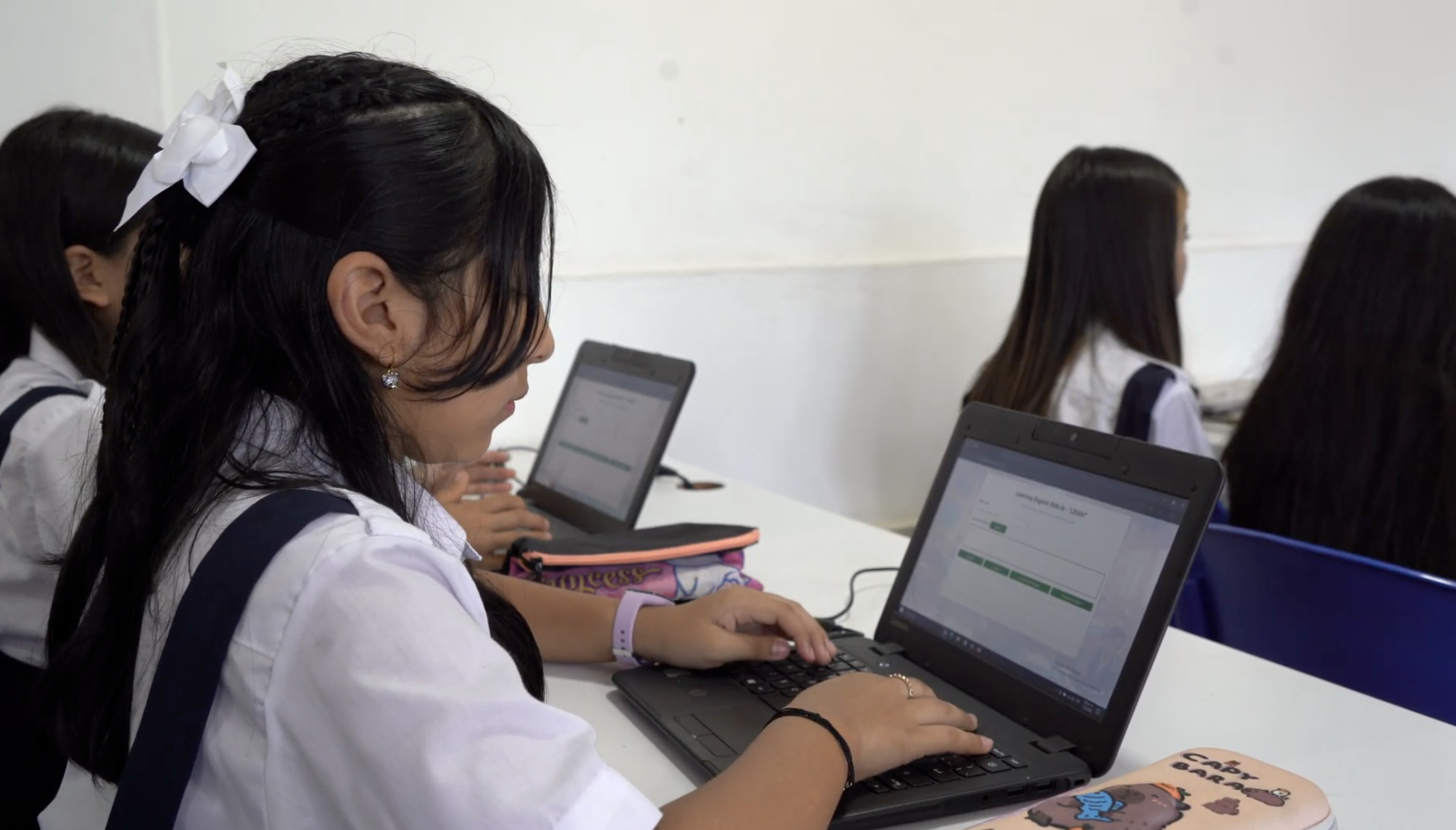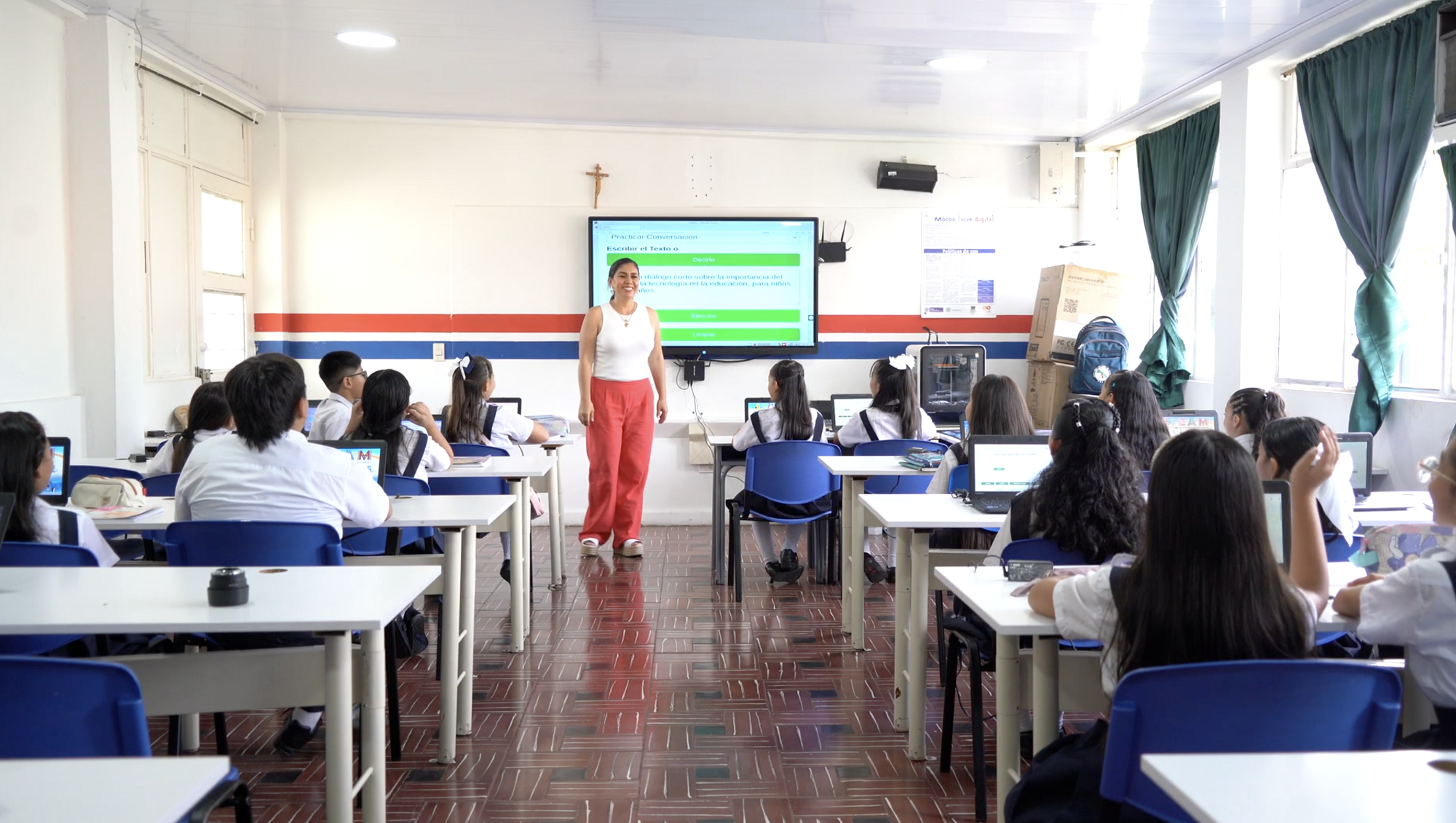Inspired by her students, a teacher from Putumayo created an app to teach English using artificial intelligence.

In a computer lab at the Santa María Goretti school in Mocoa, Putumayo, the usual murmur of children turns into a concert of keyboards, muffled laughter, and English phrases spoken with a hint of pride.
Professor Marybel Jácome, with 25 years of teaching experience, watches from a corner as her students navigate the LEWAI app she helped create.
It's not just a digital tool; it's the synthesis of years of frustration, creativity, a passion for teaching , and an unwavering faith in the potential of its students.
The origin Marybel Jácome is from Mocó. She was born, raised, and educated in the capital of Putumayo, a region known more for its stigma of violence than for anything else.
From a very young age, she knew she wanted to teach. In 1999, at just 22 years old, she graduated with a degree in modern languages. Since then, she has worked in rural and urban schools, from Villagarzón to her current school, the same one where she attended elementary school.
With a vocation tempered by the reality of southern Colombia, Jácome faced a constant barrier every day: teaching English in low-income settings.
“My students brought different dictionaries, many incomplete, others outdated. I asked them to look up a word, and they couldn't find it. That frustrated them.”
But it was that same frustration that planted the seed of LEWAI, an app that combines a translator, spell checker, grammar assistant, interactive dictionary, and AI-assisted conversation practice into a single platform. It's a kind of self-learning center designed for elementary school children.

LEWAI app. Photo: courtesy of BBVA.
The idea was born in June 2023, when Jácome joined forces with Johnny Ricardo Cerón Chávez , a systems engineer, artificial intelligence expert, and professor at the Putumayo Institute of Technology.
"He's my partner, and we share a passion for education," she says. He provided the technical structure and mastery of the algorithm; she provided the pedagogical sensitivity and classroom experience. They combined their expertise to bring the app project to fruition.
An app made in Putumayo for the world LEWAI isn't just a functional app. It's also a statement of regional pride . "Our app is from Putumayo, and I can tell you, that doesn't exist globally," says Jácome.
The tool, whose name refers to 'Learning learning English with artificial intelligence', was designed to consolidate into a single space everything that previously required opening multiple platforms such as Google Translate, WordReference, Duolingo, among others.
In addition to translating, correcting, and explaining, LEWAI has an innovative component that allows you to create conversations in English using generative artificial intelligence. "You set the prompt, depending on the need, and the app generates dialogues," he explains.
It's not yet on the Play Store, and it doesn't have any commercials. Its goal isn't to make money , and it doesn't want children to be interrupted by ads while using it.
In fact, the tool is distributed through a shared link between teachers, families, and students. Mocoa is no stranger to the technological limitations that plague other areas of the country. Connectivity is unstable, and resources are insufficient.
However, Professor Jácome has found ways to overcome the barriers. "We have three computer labs at the school. In one of them, which is a STEM lab (classrooms with an environment that encourages concentration and creativity) equipped thanks to a project, I take the children to work with the app," she says.
In that room, equipped with about 22 computers, fourth- and fifth-graders (more than 400 in total, divided into groups of up to 35 children) enthusiastically explore the app.

Fourth and fifth grade students have benefited the most from the app. Photo: courtesy of BBVA.
"Sometimes they have to share a team, but they're happy. Getting out of the classroom and away from the board motivates them. It's a different energy," he says.
They also use the app at home. A high percentage of Goretti families (estimated at 90%) have access to a cell phone with Wi-Fi. This allows children to practice and improve their English skills.
The achievements The tool has transformed not only the way we teach, but also the school environment. "Learning is now more personalized. If a child asks me something three times in class, I get tired. But the app doesn't. They can ask, correct, repeat, and always get an answer," he notes.
LEWAI also allows students to listen to what they type, in both English and Spanish, and practice pronunciation. Even if they don't want to type, they can speak to it and the tool responds.
But the most profound change, according to Jácome, is in attitude. "The children are motivated. They help each other, they work as a team, they learn how to use the keyboard, how to navigate. They're more confident speaking English. They excitedly ask me, 'Teacher, are we going to class today?'"
In June 2024, Marybel Jácome received some of the most exciting news of her career: she was a finalist for the Eduteka Hispanoamerican Prize.
Although the call was aimed only at school teachers (which is why her partner couldn't apply), she submitted the joint project and made it to the finals among hundreds of proposals from across the continent.
"The two finalists were Colombians from the Amazon. The other teachers were from Leticia, Amazonas. Imagine what that means for a region like ours," he says.
The professor says her region has been stigmatized as a zone of guerrilla warfare, drug trafficking, and violence. But there is also talent, ideas, and hope for a better future.

There are at least 35 students in each grade the teacher teaches. Photo: courtesy of BBVA.
That same year, she was recognized as a semi-finalist for the BBVA National Teacher Award , an initiative that highlights innovative experiences in education.
"I said, 'Okay, let's apply.' We met all the requirements. When they told me we were semi-finalists, it was another source of pride," he says.
Recognition came with training, networking, and, above all, visibility. “A student told me, 'Professor, you've become famous, you've gone viral.' And it was a joy for her and the entire department.”
At 47, Marybel Jácome still believes that education is the most powerful means of social transformation. That's why, along with her partner, they have decided to continue developing tools, even at their own expense.
"We pay for the subscription to artificial intelligence tools, we fund the travel, the design, everything. But we do it with love, because we believe it can make a difference," he says.
Her next project, she says with excitement, is underway. She continues working to develop new ideas that will improve learning processes, alongside her partner Cerón Chávez.
The future of LEWAI Although the app has already demonstrated its impact on hundreds of students, its creator dreams of a broader implementation. "We want the Ministry of Education to listen to us, to reach out to make this tool widely available. It can't just be limited to my school."
Connectivity remains a challenge. The governor's office suspended their internet service, and they are waiting for it to be restored. The teacher hopes to contact the governor to receive assistance.
The desire isn't personal. Jácome wants the app to have an impact beyond her classrooms. She dreams of reaching other regions with the same challenges so that children in Colombia, everywhere, have access to a tool that empowers them.
Marybel Jácome's story is, at its core , that of an educator who decided not to give up. In a country where access to a second language is still a privilege of those who live in urban centers or have economic resources , her initiative represents a paradigm shift.
While many places are talking about the future of education, in Mocoa it's already being built. From a computer lab in the middle of Putumayo, a teacher and her students explore in English the world around them, and also the world that awaits them.
ANGELA MARÍA PÁEZ RODRÍGUEZ - SCHOOL OF MULTIMEDIA JOURNALISM EL TIEMPO.
eltiempo





